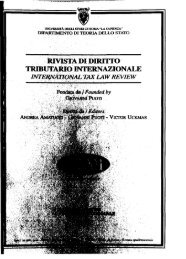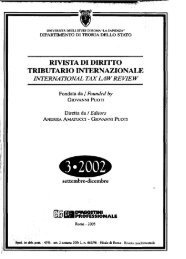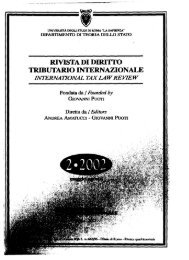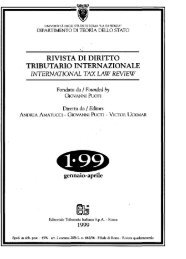RIVISTA DI DIRITTO TRIBUTARIO INTERNAZIONALE - Rdti.it
RIVISTA DI DIRITTO TRIBUTARIO INTERNAZIONALE - Rdti.it
RIVISTA DI DIRITTO TRIBUTARIO INTERNAZIONALE - Rdti.it
You also want an ePaper? Increase the reach of your titles
YUMPU automatically turns print PDFs into web optimized ePapers that Google loves.
G. Petrillo: Intetpellation in the Statute or Taxpayers' Rights<br />
taxpayer, who is free to decide to act in a manner not in keeping w<strong>it</strong>h <strong>it</strong>",<br />
does not make express reference to the consequences of possible noncompliance<br />
w<strong>it</strong>h the administrative reply by the taxpayer himself.<br />
On the matter of penai effecls, Art. 16 of Legislative Decree No. 74/2000<br />
refers exclusively to the case foreseen in Art. 21 of Law 41311991 (37). In<br />
(37) Art. 16 of Legis. Decr. No. 74/ 2000, ent<strong>it</strong>led "Alignment \v<strong>it</strong>h the Comm<strong>it</strong>tee's<br />
opionion for application of the anti-elusion laws", decrees that "No offence punishable<br />
as per this decree is const<strong>it</strong>uted by the conduct of a person \vho, having re<br />
COUI'Se to the procedure established by Art. 21 paragraphs 9 and IO of La\ .... No. 413 of<br />
30th December 1991, has complied \ .. '<strong>it</strong>h the opinions of the Ministry of Finance or<br />
the Consultant Comm<strong>it</strong>tee for application of the anti-elusion regulations established<br />
by the said provision, or has performed the operations described in the request on<br />
which assent by silence has come into effect.". On this point, see G. Bellabamba, G.<br />
Car<strong>it</strong>i, /nltovi reati tributari, Milan, 2000, page 157, according to whom "the provision<br />
of Art. 16 is solely in favour of the taxpayer and cannot be interpreted as intended<br />
to sanction the penaI relevance of elusive cases not referred to the prior valuation of<br />
the financial administration", following this Hne of reasoning, "to deem elusion equivalent,<br />
sic et simplic<strong>it</strong>er, to a penally relevant evasion would be compIeteIy erroneous,<br />
hence from this standpoint to, the judgement regarding the useless of the provision<br />
commented on is confinned from this standpoint also." For more detailed consideration<br />
of the provisions of Art. 16 of Legis. Decr. No. 74 of 10th March 2000, see P. Adonnino,<br />
Parere del Ministero delle finanZI:! e del Com<strong>it</strong>ato Consultivo per l'applicaz.ione delle<br />
norme antielusive e rilevam:a penale dell'elusione, in Riv. dir. trib., 2/2001, page 239. In<br />
particolar, w<strong>it</strong>h regard to the binding nature of the opinion in similar s<strong>it</strong>uations, the<br />
author is of the opinion that: "the "precedent" mereIy const<strong>it</strong>utes one of the elements<br />
of valuation, but not of the taxpayer's conduct for the purposes of excluding punishabil<strong>it</strong>y,<br />
but instead of the elusive or non-elusive nature of the circumstances under examination<br />
and of the specific malice of evasion in his conduct", hence in accordancw<br />
w<strong>it</strong>h the content of the Taxpayer's Statute, "as il is necessary, for the purposes of punishabil<strong>it</strong>y,<br />
for the subjective element of specific malice to be present, the good fa<strong>it</strong>h of<br />
a person who complies w<strong>it</strong>h an opinion that produces the effects mentioned, even if<br />
only in relation to those who have requested the interpellation, should not be refused<br />
recogn<strong>it</strong>ion".<br />
C. Glendi, Lo statuto dei din'tti del contribuente, in COITo trib. n. 33/2000, 2415, in<br />
relation to the combined provisions of paragraphs 2 and 3 of Art.ll, notes that if <strong>it</strong> is<br />
considered possible to extend the scope of paragraph 3 lo the penai sanctions too, "this<br />
might perhaps accred<strong>it</strong> a kind of penaI immun<strong>it</strong><strong>it</strong>y instar of what is already foreseen<br />
by Art. 21 of La\\'! No. 413/ 1991 and Art. 16 of Legis. Decr. No. 74/2000 but w<strong>it</strong>hout<br />
the specific restrictions envisaged therein".<br />
L Caraccioli, Gli effetti penali dell"'interpello ordil1an'o" dopo il regolamento e la circolare,<br />
in "il fisco", No. 26/2001, p. 8958, consistentI)' w<strong>it</strong>h what he maintains in previous<br />
wr<strong>it</strong>ings (in particular, see "Interpello "ordinario" ed interpello "speciale":diversi<br />
effetti speciali e necess<strong>it</strong>à di coordinamento, ivi, No. 41/2000, p. 12375), after having obsenied<br />
that the fiscal profiles cannot be considered identical \\'<strong>it</strong>h those of a strictly<br />
fiscal nature, concludes that:" as regards the penai effects of ordinary interpellataion,<br />
as Art. Il, paragraph 3, of Law No 212/2000 foresees the non-applicabil<strong>it</strong>), of penalties<br />
in the case that no reply is given, as this const<strong>it</strong>utes assent by silence \ .... hich prevents,<br />
aIready from the objective standpoint, any penaI consequence \vhatsoevec as<br />
<strong>RIVISTA</strong> <strong>DI</strong> DlRITID <strong>TRIBUTARIO</strong> Ii\TERNAZIO:çALE 3noOl






